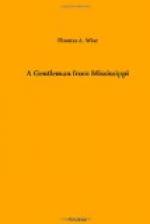At the home he had later established in Washington as preferable to the International Hotel were frequently seen a small coterie of Senators and Congressmen who had become known to the sarcastic party bosses in both houses of Congress as the “Langdon crowd,” which crowd was admitted to be somewhat a factor when it finally prevailed on the President to take over 11,000 postmasters from the appointment class and put them under the control of the Civil Service Commission, resulting in the necessity of a competitive examination for these postmasters instead of their securing positions through political favoritism.
Those who did not know Langdon intimately suggested that “this fellow ought to be ‘taken care of.’ What in God’s name does he want? A committee chairmanship? An ambassadorship for some Mississippi charcoal burner? A couple of Federal judgeships for his friends? Well, whatever it is, give it to him and get him in with the rest of us!”
Again it was Peabody who had the deciding say.
“There’s only one thing worse than a young reformer, and that’s an old one,” he laughed bitterly at a secret conclave at his apartment in the luxurious Louis Napoleon Hotel. “The young one thinks he is going to live and wants our future profits for himself. The old one thinks he’s going to die, and he’s sore at leaving so much graft behind him.”
Heads and hearts thinking and throbbing together, Langdon and his secretary had learned to lean on each other, the young gaining inspiration from the old, the old gaining strength from the young. They loved each other, and, more than any love, they trusted one another. And Hope Georgia watched it all and rejoiced, for she believed with all the accrued erudition of eighteen years of innocent girlhood that Mr. Bud Haines was quite the finest specimen of young manhood this world had ever produced. How could he have happened? She was sure that she had never met his equal, not even in that memorable week she had spent in Jackson.
The passing weeks taught Haines that he was deeply in love with Carolina, and, though he had endeavored to keep the knowledge of this from her, her woman’s intuition had told her his secret, and she stifled the momentary regrets that flitted into her mind, because she was now in “the game” herself, the Washington game, that ensnares the woman as well as the man and makes her a slave to its fancy. No one but herself and Norton knew how deeply she had “plunged” on a certain possible turn of the political cards. She must not, she could not, lose if life itself were to remain of value to her, and on her sway over this secretary she was told it all depended.




